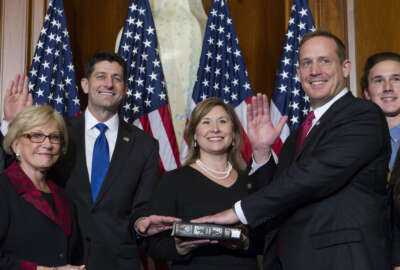
Pre-shutdown scarlet letter for feds: N for ‘nonessential’
How would you like to find your name on a public list of half a million to 750,000 other civil servants who have been judged NONESSENTIAL to government operations?
How would you like to find your name on a public list of half a million to 750,000 other civil servants who have been judged by their bosses (and because of their jobs) as NONESSENTIAL to government operations? Not really needed for whatever their federal agency, bureau or department does. What kind of a negative move (as in kick in the butt) would that be?
With the countdown ticking toward the next (March 23) possible government shutdown, many feds in the bulls eye have to be wondering (again) what’s in it for them?
During the last couple of shutdowns—both relatively short by previous standards—did you come in to work to shutdown operations, then head for home? Because you were labeled as nonessential? Did you hide from your friends and neighbors because you didn’t want them to know you really weren’t needed?
If the next scheduled shutdown happens, how long will it last? Will people get paid—eventually—and if so, when?
Prepping for the last two relatively short shutdowns cost taxpayers thousands of dollars in time and effort as each agency wrote, rewrote or revised their shutdown manuals based on the 35-page directive from the Office of Personnel Management that was updated on January 24 of this year.
To add insult to injury, the next shutdown could come with orders for each agency to send Congress and make public “the name of each employee of the agency who was furloughed” as well as the job title and the salary for each employee. What harm could that do, right?
The bill, by Rep. Ted Budd (R-N.C.), has been referred to the House Committee on Oversight and Government Reform. Given the speed of Congress, chances of it becoming law anytime soon—certainly by the shutdown deadline—are slim and none. But it is out there. And it could be a problem down the road for feds and their family members who have grown accustomed to eating regularly.
Many people believe it is unlikely it will happen. This year or ever. But it could. And if it did, that could paint the public an even bleaker picture of the government. If employees aren’t needed during a shutdown, some would ask, why are they needed at all? FAA air traffic controllers we get. The same for border patrol agents. Homeland Security people on the front-line. And for many (but maybe not all) at the CIA, FBI, DIA, National Security Agency. NASA scientists could keep working on the next moon landing, a trip to Mars or watching out for killer asteroids. But what would the public say about support staffers who could wind, with their annual salaries alongside, on that N-list?
Want to see for yourself? The bill, by congressional standards, is very short, sweet and to the point. The point, for lots of people, is what’s the point? And what next: a public list of nonessential members of Congress? That could prove interesting.
Nearly Useless Factoid
Despite its status as an instant best-seller and literary classic, Nathaniel Hawthorne only made $1500 from “The Scarlett Letter” in the 14 years between its publishing and his death.
Source: Wikipedia
Copyright © 2025 Federal News Network. All rights reserved. This website is not intended for users located within the European Economic Area.
Mike Causey is senior correspondent for Federal News Network and writes his daily Federal Report column on federal employees’ pay, benefits and retirement.
Follow @mcauseyWFED





